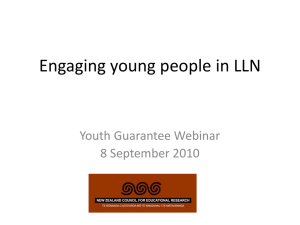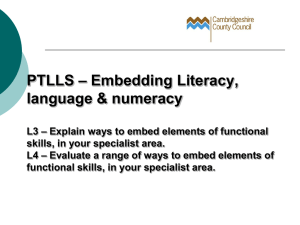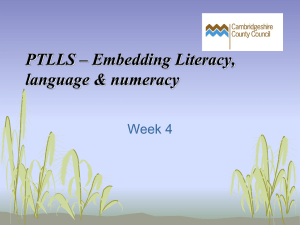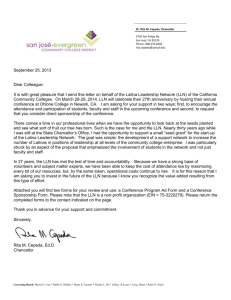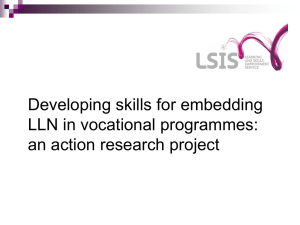LL1001_11 Learnning Anecdotes - Itslife
advertisement
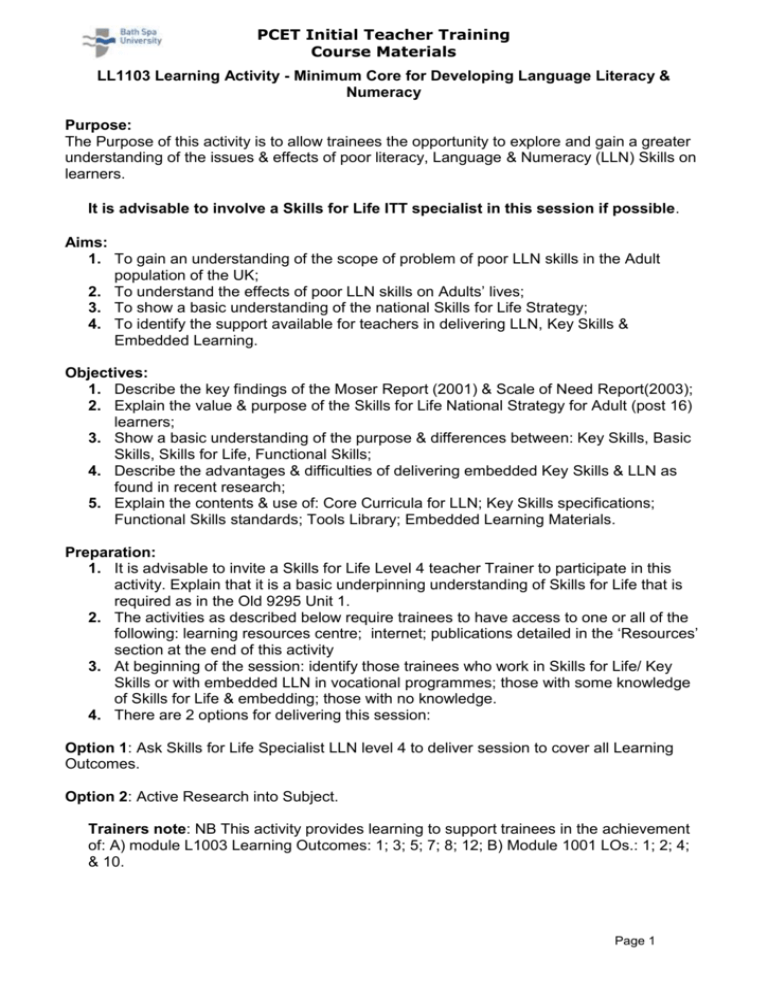
PCET Initial Teacher Training Course Materials LL1103 Learning Activity - Minimum Core for Developing Language Literacy & Numeracy Purpose: The Purpose of this activity is to allow trainees the opportunity to explore and gain a greater understanding of the issues & effects of poor literacy, Language & Numeracy (LLN) Skills on learners. It is advisable to involve a Skills for Life ITT specialist in this session if possible. Aims: 1. To gain an understanding of the scope of problem of poor LLN skills in the Adult population of the UK; 2. To understand the effects of poor LLN skills on Adults’ lives; 3. To show a basic understanding of the national Skills for Life Strategy; 4. To identify the support available for teachers in delivering LLN, Key Skills & Embedded Learning. Objectives: 1. Describe the key findings of the Moser Report (2001) & Scale of Need Report(2003); 2. Explain the value & purpose of the Skills for Life National Strategy for Adult (post 16) learners; 3. Show a basic understanding of the purpose & differences between: Key Skills, Basic Skills, Skills for Life, Functional Skills; 4. Describe the advantages & difficulties of delivering embedded Key Skills & LLN as found in recent research; 5. Explain the contents & use of: Core Curricula for LLN; Key Skills specifications; Functional Skills standards; Tools Library; Embedded Learning Materials. Preparation: 1. It is advisable to invite a Skills for Life Level 4 teacher Trainer to participate in this activity. Explain that it is a basic underpinning understanding of Skills for Life that is required as in the Old 9295 Unit 1. 2. The activities as described below require trainees to have access to one or all of the following: learning resources centre; internet; publications detailed in the ‘Resources’ section at the end of this activity 3. At beginning of the session: identify those trainees who work in Skills for Life/ Key Skills or with embedded LLN in vocational programmes; those with some knowledge of Skills for Life & embedding; those with no knowledge. 4. There are 2 options for delivering this session: Option 1: Ask Skills for Life Specialist LLN level 4 to deliver session to cover all Learning Outcomes. Option 2: Active Research into Subject. Trainers note: NB This activity provides learning to support trainees in the achievement of: A) module L1003 Learning Outcomes: 1; 3; 5; 7; 8; 12; B) Module 1001 LOs.: 1; 2; 4; & 10. Page 1 PCET Initial Teacher Training Course Materials Tasks for Option 2: 1. Explain that this session is intending to focus on key elements related to: improving retention & achievement; identifying and reducing barriers to learning & achievement; identifying support available within organisations to help learners’ achievement. 2. Undertake a brief oral Initial Assessment of group’s existing knowledge of: Moser Report; Scale of Need Survey; Key Skills Specifications; Language, Literacy & Numeracy Core Curriculum; Functional Skills; recent research into the value & use of embedding LLN in vocational courses. 3. Divide trainees into 4 groups. Using initial assessment results place those learners with previous knowledge of the subject into groups where they have least knowledge. Ensure that each group has a spread of trainees with some, little & no existing knowledge of subject. 4. Timing: 30-40 minutes for research; 10 mins per group to feed back results + 5mins for questions; 30 minutes for whole/large group discussion. 20 minutes for input, from SfL or ITT trainers on organisations’ LLN support arrangements. 5. Each group divide into pairs or 3s & are given the tasks & questions detailed below: Group 1: The Moser Report, Scale of Needs Survey and National Strategy for Skills for Life. Why did the Moser Report (2001) consider that the skills of Language & Literacy (English & Communication); Numeracy (Maths) were of such importance in the adult population of the UK? What were the key findings? What were Moser’s recommendations? What did the ‘Scale of Need Survey’ (2003) find out? What were its recommendations? What is the National Skills for Life Strategy? How far has it been achieved? Who funds & manages it? Resources: Moser Report (2001) www.lifelonglearning.co.uk/mosergroup Skills for Life National Strategy (dfes) www.talent.ac.uk www.dfes.gov.uk/readwriteplus Scale of Need Survey (2003) www.basic-skills.co.uk/site/page Group 2: Unpicking the similarities & differences What are: a) Key Skills b) Basic Skills; c) Skills for Life; d) LLN; e) Functional Skills? How are they different? How are they similar? What are & where can the following be found: Key Skills Specs; Core Curriculum; Functional Skills standards? What support is available to teachers to help them understand & deliver the above? Resources: www.keyskillssupport.net Page 2 PCET Initial Teacher Training Course Materials www.dfes.gov.uk/keyskillssupport Core Curriculum documents (dfes) www.dfes.gov.uk/readwriteplus Functional Skills Frequently Asked Questions (dfes) www.dfes.gov.uk/functionalskills Group 3: Support & Resources for teachers: What is an embedded approach to teaching & assessing Key, Basic, LLN, functional Skills? What is Skills for Life: a) Initial Assessment (IA); b) Diagnostic Assessment (DA); Why are these important for ALL learners on ALL courses? What are the consequences for: a) learners; b) providers of poor IA & DA practice? What free resources are available for teachers to use with their learners to: a) develop embedded approaches to teaching these skills; b) undertake initial assessment & diagnostic assessment of learner skills in Literacy, Language & Numeracy levels? What are the titles & subjects covered? Appraise the usefulness & effectiveness of each resource researched. What subject areas are covered? Resources: Embedded Learning Materials Folders (Dfes) www.dfes.gov.uk/readwriteplus/embeddedmaterials www.keyskillssupport.net www.toolslibrary.co.uk www.bbc.co.uk/skillswise www.moveon.org.uk www.moveonup.org.uk Group 4: ‘Recent Research into success in embedding’. What are the key findings of each of the following research reports? What are the messages contained in the reports for teachers & managers in the Post 16 sector: a) about the value of embedding; b) about how to: set up the process; c) deliver & assess embedded LLN, Key Skills or Functional Skills? Research: Recent Reports: New Light on Literacy, Language & Numeracy ‘Skills for Life- Four Years on’: Bynner & Parsons NRDC 2006; www.nrdc.org.uk/publications ’You don’t expect a Maths Teacher to teach Plastering’ Embedded LLN the effects on Retention & Achievement; Casey et al NRDC 2006. www.nrdc.org.uk/publications Reflect: Issue 6 NRDC 2006. www.sflqi.org.uk/embeddedteachingandlearning 6. Trainer to manage feedback & timing to whole group: 10 mins per group to feed back results + 5mins for questions; trainer/SfL specialist to give clarifications & corrections after each small group delivery ensuring that key learning on the topics is highlighted & emphasized. Page 3 PCET Initial Teacher Training Course Materials 7. Learning to Support development of Individuals Skills in LLN, KS & Functional Skills: Input from ITT trainer or SfL specialist on support arrangements for LLN & KS for individuals within this organisation. Elicit from trainees what happens in their department or organisation. This can be done as a small group work or whole group exercise. Ask them in view of new learning from today to appraise what they do and identify desirable improvements, and what support they & their learners might need to achieve that. Additional Resources for this activity are available electronically in a separate file Title: Resources for Minimum Core Part ‘A’. The file is too big to include in this assignment. Page 4
